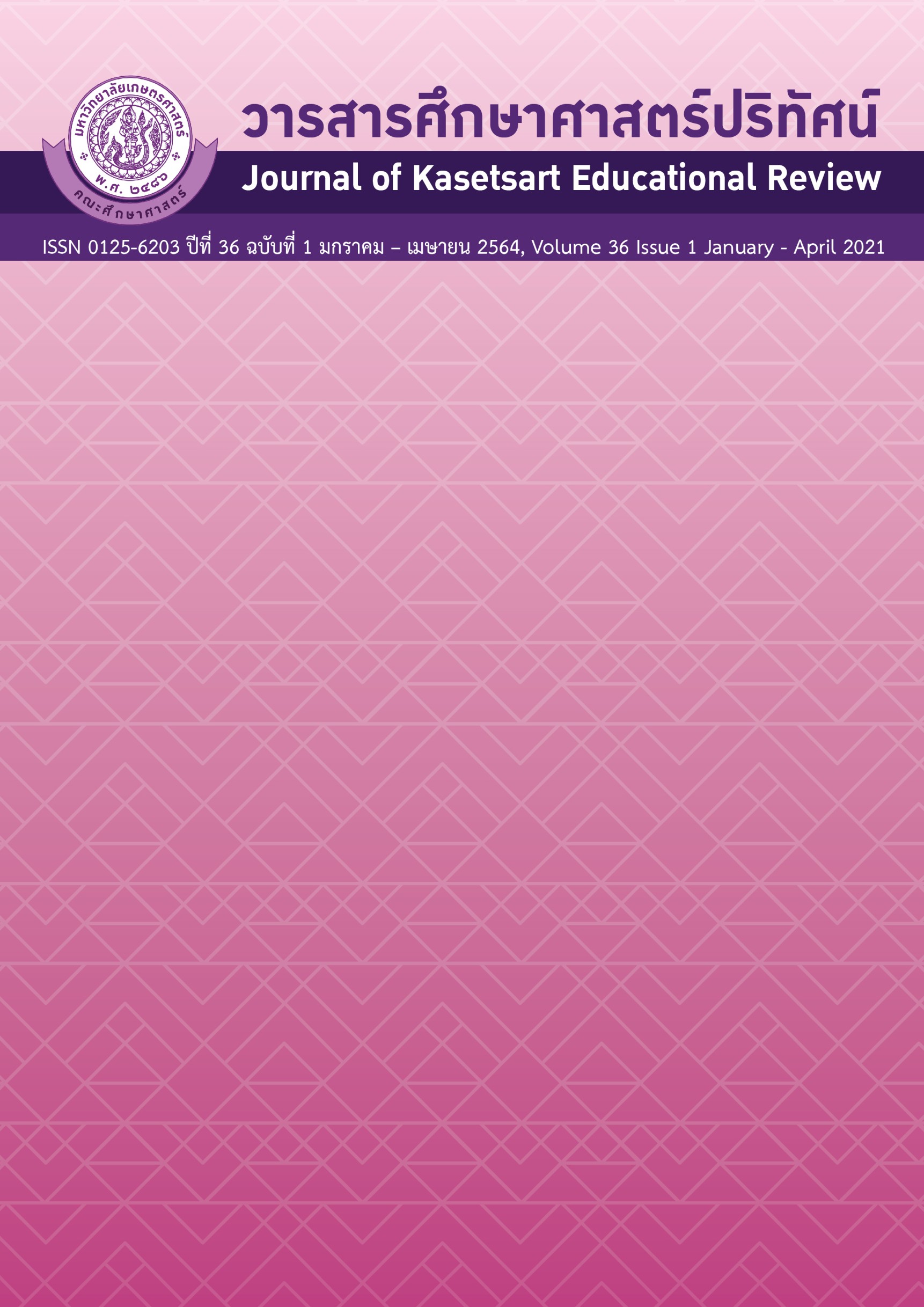รูปแบบการเรียนการสอนวิทยาศาสตร์โดยใช้โครงงานเป็นฐานเพื่อพัฒนาทักษะการสร้างสรรค์และนวัตกรรมของนักศึกษา
คำสำคัญ:
การเรียนการสอนวิทยาศาสตร์, การเรียนรู้โดยใช้โครงงานเป็นฐาน, ทักษะการสร้างสรรค์และนวัตกรรมบทคัดย่อ
การวิจัยนี้มีวัตถุประสงค์เพื่อ 1) ศึกษาสังเคราะห์เนื้อหาเกี่ยวกับการสอนวิทยาศาสตร์โดยใช้โครงงานเป็นฐาน และ 2) เสนอรูปแบบการเรียนการสอนวิทยาศาสตร์โดยใช้โครงงานเป็นฐานเพื่อพัฒนาทักษะการสร้างสรรค์และนวัตกรรมของนักศึกษา กลุ่มเป้าหมายคือผู้สอนและนักศึกษาคณะวิทยาศาสตร์ เครื่องมือที่ใช้ได้แก่ แบบสังเคราะห์เอกสารและแบบสัมภาษณ์แบบมีโครงสร้าง วิเคราะห์ข้อมูลด้วยการวิเคราะห์เชิงเนื้อหา (content analysis) รูปแบบการเรียนการสอนที่พัฒนาขึ้นมี 5 องค์ประกอบ แต่ละองค์ประกอบของรูปแบบมีรายละเอียดดังนี้ 1) หลักการ เป็นการจัดการเรียนรู้ที่เน้นผู้เรียนเป็นสำคัญทำให้ผู้เรียนได้รับประสบการณ์ ได้ลงมือปฏิบัติเพื่อฝึกทักษะต่างๆด้วยตนเองทุกขั้นตอนและสามารถพัฒนาทักษะต่างๆ โดยใช้กระบวนการทางวิทยาศาสตร์ที่เริ่มจากการกระตุ้นความสนใจหรือค้นหาปัญหาด้วยตนเองและหาวิธีการแก้ปัญหา โดยร่วมกันวางแผนงานอย่างเป็นระบบ ลงมือปฏิบัติตามแผนงานจนได้ผลการศึกษาและข้อสรุปในเรื่องนั้น ๆ 2) วัตถุประสงค์ เพื่อพัฒนาทักษะการสร้างสรรค์และนวัตกรรมของนักศึกษา 3) การจัดการเรียนรู้ 7 ขั้นตอน ได้แก่ 3.1) กำหนดเป้าหมายร่วมกัน (Define) 3.2) ให้ความรู้ (Teach) 3.3) คิดหัวข้อ (Think) 3.4) วางแผนทำโครงร่าง (Plan) 3.5) ทำโครงงาน (Do) 3.6) นำเสนอผลงาน (Present) 3.7) การประเมินผล (Evaluate) 4) การวัดและประเมินผล ประเมินทักษะการสร้างสรรค์และนวัตกรรมและนวัตกรรมของนักศึกษา และ 5) เงื่อนไขสำคัญ ผู้สอนจะต้องเป็นผู้ที่มีความแม่นยำในเนื้อหาและสามารถอำนวยความสะดวกให้ผู้เรียนตลอดการดำเนินกิจกรรม
เอกสารอ้างอิง
Standards for Higher Education, B.E. 2562 (dated February 26, 2019). [in Thai].
Jai-ari, C. (2016). The development of science teaching model in the classroom strengthen problem
solving skills (Doctor of Philosophy thesis). Bangkok : King Mongkut's University of Technology North Bangkok.[in Thai].
Paima, N. & Walepitakdet, W. (2017). Study of learning management model by using project as base And
learning management like a friend helping friends. Journal of Vocational Education and Technical Education, 7 (13), 16-26. [in Thai].
Yohlao, D. (2014). A Study of PBL Learning Management from the Knowledge Building Project for
Strengthening 21st Century Skills for Children and Youth: Based on the successful experiences of
Thai schools. Bangkok: Thippay Wisut Ltd., Part. [in Thai].
Khemmanee, T. (2017). Teaching Science for effective learning process management. Bangkok:
Chulalongkorn University Printing House. [in Thai].
Gujral, T & Adipattaranan, N. (2018) .Using project-based learning as a basis for increasing skills reading
and writing english and critical thinking skills of mathayomsuksa 5 students. Veridian E-Journal, Silpakorn University. 11 (3), 1544-1556. [in Thai].
Ayrirat, T. & Ayrirat, W. (2019). A model of learning activities to promote ideas creative innovation for
secondary school students according to the National Education Plan framework 2017-2036 for educational management 4.0, Journal of Computer Science and Information Technology Project, 5 (1), 52-64. [in Thai].
Piangduangjai, N. & Nilapun, M. (2016). Development of a model for managing science by Using Projects
with techniques of searching for knowledge According to the classroom concept To enhance the ability to create innovation and mental science of mathayomsuksa 3 students, Silpakorn Journal of Educational Research, 9 (2), 190-204. [in Thai].
Songkhram, N. (2014). Innovation Change learners into innovators. Bangkok:Publisher of Chulalongkorn
University. [in Thai].
Nilsuk, P. & Wanphirun, P. (2013). Imaginary learning (Imagineering). Journal of Technical Education
Development, 25 (86). Retrieved 28 February 2016. Accessed from https://www.academia.edu [in Thai].
Sirisak, P.(2011). Development of an Environmental Science Teaching Model Based on Educational
Concepts Based on A place to promote the location and environmental knowledge of lower secondary school students (Doctor of Thesis). Bangkok: Chulalongkorn University. [in Thai].
Dejagupta, P. and et al. (2008). Teaching Thinking through Integrated Teaching and Learning Project.
Bangkok: Chulalongkorn University. [in Thai].
Panakit, P. (2015). Development of Teaching Model to Promote Problem Solving Ability in Creative and
scientific innovation of elementary school students. (Doctor of Philosophy). Nakhonpathom:
Silpakorn University.[in Thai].
Sinlarat, P. and et al. (2014). Full growth potential to the 21st century of Thai education. Bangkok:
The Publisher of Chulalongkorn University. [in Thai].
Nilapun, M. (2012). Research methods in education. 7th edition, Nakhonpathom: Research and
Development Center Educational, Faculty of Education Silpakorn University. [in Thai].
Ramsiri, R. (2013). Development of a science-based teaching and learning model based on research to
Enhance research skills Creative Problem Solving Skills and Psychological Sciences of Secondary School Students. (Doctoral Philosophy Program Thesis). Nakhonpathom: Silpakorn University. [in Thai].
Kaew-Urai, R. & Muenadej, S. (2014). 8 steps of project study with Social media to promote skills in the
21st century. Journal of Educational Technology and Media. Convergence Mahidol University, 1 (1), 1-17. [in Thai].
Pongeng, W. Pratumsuwan, P. & Houtaman, S. (2015). Teaching and learning management Project-based.
Retrieved 29 August 2015, from http://www.fte.kmutnb.ac.th.
Panich, W. (2012). The way to create learning for pupils in the 21st century. Bangkok: Sodsri Foundation.
Sarit Wong. Retrieved 8 February 2014, from http://www.noppawan.sskru.ac.th. [in Thai].
Wongyai, W. & Patthaphon, M. (2019). Source of leadership center Curriculum innovation and learning
Accessed 8 February 2019, from www.curriculumandlearning.com. [in Thai].
Wongyai, W. & Patthaphon, M. (2015). Coaching Paradigm to Enhance Creative Skills and Innovation. 1st
edition. Bangkok: Sanit Wong Printing Co., Ltd. [in Thai].
Pharanud, W. (2014). Development of a science-based teaching model that promotes a contentious
Argument reason. (Doctor of Thesis). Mahasarakham: Mahasarakham University. [in Thai].
Maneewan, S. (2018). Developing a project-based learning model with synergy through Cloud technology
to promote creativity and innovation. The Vocational Journal And technical studies, 8 (15), 63-76.
The Secretariat of the Council of Education (2017). National Education Plan 2017-2036. Retrieved 16 April
2017, from https://www.onec.go.th/index.php/page/view/Outstand/2532. [in Thai].
Rattanakonsat, S. & Wongtatham, P. (2016). Design and Development of Lessons on Network using the
project as the base to promote creative thinking skills. The twelfth National Conference on
Computing and Information Technology NCCIT2016,404-409. [in Thai].
Thanetwiraphot, A., Chaichatphonsuk, P., Chowpricha, C. and Suwannakit, S. (2019). Creating innovation in
science teaching through project-based learning with efficiency High standard. Journal of Science, Technology and Environment Research Unit for Learning, 10 (1). [in Thai].
Rojwattanaboon, O. (2010). Development of innovative leadership model. (Doctor of Philosophy thesis).
Bangkok: Graduate School National Institute of Development Administration. [in Thai].
Joyce, B., Weil, M. and Calhoun, E. (2009). Models of Teaching. New York: Pearson Education, Inc.
The Partnership for 21st Century Learning. (2015b) .What We Know about Creativity. Retrieved from
http://www.p21.org/storage/documents/docs/Research /P21_4Cs_Research_Brief_Series-Cre ativity.pdf, August 15, 2018.
ดาวน์โหลด
เผยแพร่แล้ว
ฉบับ
ประเภทบทความ
สัญญาอนุญาต
บทความทุกบทความเป็นลิขสิทธิ์ของวารสารคณะศึกษาศาสตร์ มหาวิทยาลัยเกษตรศาสตร์ วิทยาเขตบางเขน
วารสารศึกษาศาสตร์ปริทัศน์ (Kasetsart Educational Review)






